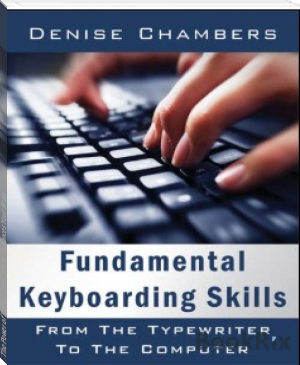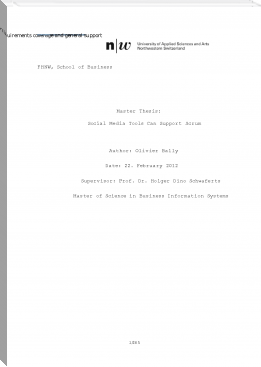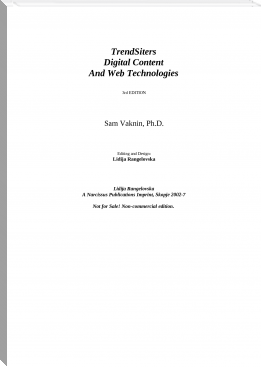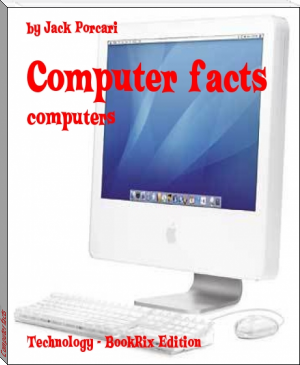The Power of Typing: How Typing Enhances Your Brain by Denise Chambers (13 ebook reader txt) 📕

- Author: Denise Chambers
Book online «The Power of Typing: How Typing Enhances Your Brain by Denise Chambers (13 ebook reader txt) 📕». Author Denise Chambers
In the digital age when computers and mobile phones have become ubiquitous machines and devices, typing has become an essential skill that one must learn and master. By definition, typing is the process of inputting text by pressing keys on a typewriter, computer keyboard, mobile phone, or calculator. This text can be in the form of letters, numbers, and symbols.
The development of typing has brought numerous benefits to humans. For one, it has increased the productivity levels of workers in various industries, particularly those who are working white-collar jobs. In the literary world, typing has also been quite beneficial – it has made the job of authors easier, and it has made the production of books easier and faster-paced.
Indeed, typing is such a powerful skill to obtain. There is an enormous power in typing. Power typing does not only make the jobs of humans easier and more convenient, but it also improves their mental capacity and well-being. To learn more about this topic, this article briefly discusses below how power typing enhances the human brain.
Power typing enhances memory
Power typing can enhance your memory because whenever you type, your brain is pushed to remember two things simultaneously: the spelling of the words you are typing and the placement on the keyboard of the keys necessary to form those words. By consistently trying to type correctly to get the spelling of those words right and to press the correct keys, your brain, particularly its memory department, is being exhaustively worked out. The continuous task of remembering two different sets of information at once helps strengthen the neural networks of the brain that control the memory. Hence, power typing indeed has the potential to enhance memory.
Power typing improves hand-eye coordination
Hand-eye coordination is a cognitive skill wherein the visual system of a person is able to coordinate the information it receives through the eyes to control, direct, and guide the hands in accomplishing a certain task such as catching a ball or handwriting. However, not everyone has a good hand-eye coordination. Some people struggle to play a game of catch or to write legibly because they have poor hand-eye coordination. Fortunately, there several ways to solve, or at least, improve this. Power typing, particularly, is one of the most powerful ways to strengthen the connection between eye movement and hand movement because it is a continuous action. The lack of pauses while typing greatly practices both the eyes and the hands in working together at once.
Power typing improves concentration
Since typing is a continuous task that needs the adequate attention of a person, it prompts that person to concentrate and focus. For this reason, it can be argued that power typing also has the ability to improve the concentration of humans. When you are typing, you tend to focus on getting the right spelling of your words, pressing the right keys, and typing what you want to type correctly. Doing all of these tasks simultaneously, of course, requires immense focus. Hence, subsequently, it tends to push your brain to thwart any distraction that may come your way.
Power typing allows smoother flow of thoughts
This benefit is especially important for authors and writers. When you type, particularly when you have already mastered the placement of all the keys on the keyboard, the flow of your thoughts tend to be smoother and more coherent compared to when you still need to write your thoughts down on a piece of paper. This is because power typing is generally faster than handwriting. Thus, the amount of time that you spend on finishing a single word when handwriting can already be spent on thinking and organizing your thoughts when you are typing.
Power typing strengthens the connections between hemispheres
Most people are either right-handed or left-handed. Whether one is right-handed or left-handed is largely up to the central sulcus – the part of the brain that determines right-hand or left-hand dominance. However, some people actually have the ability to use both of their hands simultaneously. Activities like playing the piano or power typing are great exercises that challenge the brain to fight against the dominance of either the right-hand or the left-hand because they require both hands to work together. Scientifically, experts have even found that the brains of pianists or typists, in fact, function differently than most people, as they tend to have a more symmetrical central sulcus.
Without a doubt, typing is a potent skill that brings numerous benefits to the way people think and do their jobs. In essence, power typing is a power. Having the ability to type fast without looking at the keyboard or the keypad is a skill that not everyone possesses, but is greatly advantageous for all. If you want to increase your work pace or if you wish to enhance the capacity of your brain, then power typing is something that you need start turning into a habit now!
ImprintPublication Date: 03-11-2020
All Rights Reserved
Dedication:
Power typing enhances memory Power typing can enhance your memory because whenever you type, your brain is pushed to remember two things simultaneously: the spelling of the words you are typing and the placement on the keyboard of the keys necessary to form those words. By consistently trying to type correctly to get the spelling of those words right and to press the correct keys, your brain, particularly its memory department, is being exhaustively worked out. The continuous task of remembering two different sets of information at once helps strengthen the neural networks of the brain that control the memory. Hence, power typing indeed has the potential to enhance memory. Power typing improves hand-eye coordination Hand-eye coordination is a cognitive skill wherein the visual system of a person is able to coordinate the information it receives through the eyes to control, direct, and guide the hands in accomplishing a certain task such as catching a ball or handwriting. However, no





Comments (0)